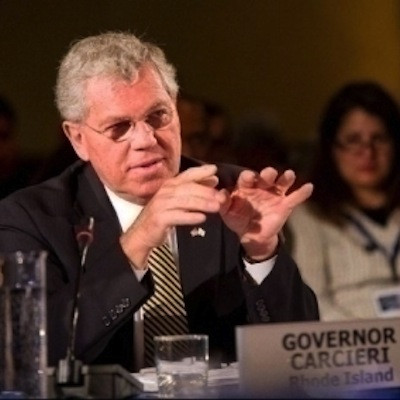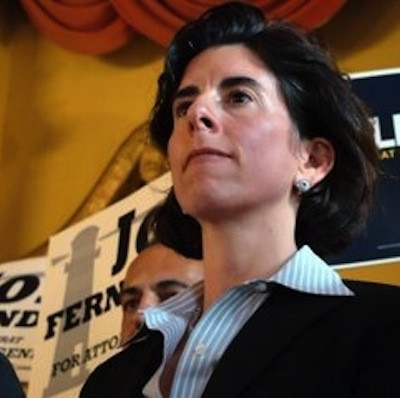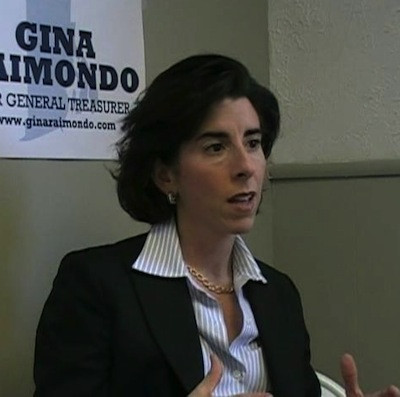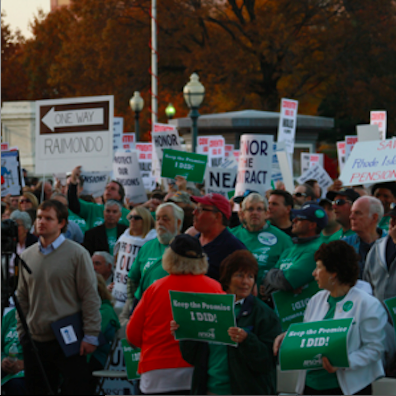Lisa Blais: Third Rail of Politics – Public Sector Unions
Thursday, February 20, 2014
It may be the third rail of politics to discuss the impact of public sector unions in RI. But, legitimate questions must be raised when labor partners with the state’s governor and treasurer to avoid litigation that they brought to the state while disenfranchising their retiree community. They sued the state following the 2011 pension reform that the General Assembly passed into statute following months and months of vetting the details of the changes that were contained in the proposed measures of reform.
Labor and state disenfranchising retirees and taxpayers.
Where was the outcry from union leadership when conditions were set by statute that created an unsustainable and unaffordable state defined benefit plan many years prior to 2011? They have been complicit to the factors that have led to the problem that retirees, active state employees and taxpayers still face and will face for years to come. Why has labor agreed to disenfranchise their retiree community by deciding that anyone who does not cast their vote for this proposed settlement will be counted as a vote in support of the settlement? Why have the governor and treasurer disenfranchised the taxpayers in RI most notably by freezing out the General Assembly? They agreed to federally mediated settlement discussions knowing full well that the key decision makers from the legislature were not at the table.
GET THE LATEST BREAKING NEWS HERE -- SIGN UP FOR GOLOCAL FREE DAILY EBLASTIn the private sector, when parties to a disagreement agree to mediation, the core expectation is that the decision makers are at that table!
The answers to these questions do not lie in avoidance of the potential costs to take this lawsuit to the Supreme Court.
The basis of labors’ lawsuits was grounded in challenging the legislatures’ authority to pass, change or repeal laws in RI. Governor Chafee, Treasurer Gina Raimondo along with a variety of labor representatives would have you believe that their proposed mediated pension settlement is good for RI because it avoids the costs of a protracted journey to the Supreme Court. That’s hard to believe. Labor has argued in the past that cities and towns spend too much on legal counsel and so to avoid those financial and economic disagreements the municipalities should just take that money and use it to meet labors’ collective bargaining demands. In the context of the pension settlement, following that train of thought labor left taxpayers’ money on the table and shortchanged their membership.
Labor is good with no answers.
The larger point is that labor likely does not want a court decision about the constitutionality of the legislative changes to the state pension. Their argument is that there is an implied contract. Consider that no collective bargaining agreement was signed by the state on behalf of the legislature (makes no sense) that outlined the terms and conditions of employment (as compared with collective bargaining agreements that are signed on the municipal and school district level). In absence of a collective bargaining agreement, employees typically receive an employee handbook (standard practice in the private sector) that generally outlines conditions of employment but includes a disclaimer that the employer reserves the right to change, delete or amend the contents of that handbook and, in particular, policies of the employer, at any time. In this situation, the state is the employer and the legislature (that sets public policy) by law provided for multiple changes to pension statute over many years; sometimes improving the benefits of the defined benefit plan and sometimes constricting those benefits. In addition, if you were to review a local collective bargaining agreement, any benefits that are contained in the agreement that are a direct result of legislative action usually contains language that clarifies that those benefits are in accordance with that law or statute and therefore are dependent upon the law or statute that is referenced.
If a final Supreme Court ruling determined that the RI legislature has the authority to change, pass or repeal statute then labor’s sway to threaten lawsuits in the future is diminished. If it did not then that decision would likely reverberate across the country because it would shake the very ground that state legislatures stand on. This is a critical question that should be answered.
Flip-flopping leaders.
You bore witness to the flip flopping of Treasurer Gina Raimondo and Governor Chafee as they tried to convince taxpayers that a settlement, which would cost significantly more than the 38Studios debacle, is good for everyone. It is inconceivable how hundreds of millions of dollars in additional expense is good for the taxpayer. At an additional cost of $24 million in just the first year, it is sure to be more than an additional $125 million over the next five years.
If you think state and property taxes are already too high, then the result must be money diverted from education, transportation and bridge maintenance, Medicaid and other welfare programs, as well as the continued pillaging of programs for the developmentally disabled and DCYF.
Pension Settlement begs the big question.
Last week's theatrics are precisely the reason that ultra progressive President Theodore Roosevelt and labor leader George Meany forewarned that public sector unions and subsequent collective bargaining had no place in government. Both fully understood the damage that would ultimately be inflicted on taxpayers when government is held hostage to the demands of public labor unions and the power they would wield as they fight to extort financial resources from taxpayers. Government simply cannot run effectively when public unions, via their negotiating power and by their propensity to target elected officials and replace them with their own members or employees control the government purse.
Judge Taft-Carter, through her requirement for federal mediation, confirmed this, as has Treasurer Gina Raimondo and Governor Chafee through their united front in accepting the pension settlement agreement. The decision to backtrack on legislative reform makes it crystal clear that if your elected officials have a desire to run government effectively, for the sole benefit of every taxpayer as it was intended, public unions cannot exist.
Why is it that Rhode Islanders continue to support the concept of government unions? Everyone you meet on the street complains about high property taxes, high state taxes, increases in fees, whether it be for the beach or for the DMV, and lack of road repairs. The result of this mediation is the connection between those high taxes and the cost of government. The public unions do what they do best - they get as much as they can for their members. And that's not just a fiscal conservative opinion; it's that of union members themselves and is the unions’ obligation to do so. At the time of pension reform, the Providence Journal interviewed some rank and file members who benefitted from the public union collective bargaining process. One retired Coventry teacher said "We started taking, taking, taking. It got to the point where it was embarrassing." A retired professor from RIC, "I think it is inevitable that some changes have to be made." A retired Providence teacher said she agreed with the need to reform a pension system that has become unsustainable. "I totally understand. Years ago, big errors were made that I admit I got advantage from." Unfortunately for taxpayers, it comes from us.
Why is it that the newer members of public unions accept a mandatory, automatic deduction from their paycheck to pay dues to an organization that collectively bargains for them to pay for better benefits for the older generation of public employees?
A Stacked Deck.
Public unions have a significant advantage over taxpayers in the "negotiating process". All of the negotiations are done in secret, behind closed doors. The taxpayer has no idea what they are party to, they only pay for it. Take the court ordered mediation. Everyone was required to keep the "big" secret as a result of a gag order. But according to Ted Nesi from WPRI, former deputy House majority leader turned partner of Checkmate Consulting, was keeping the rank and file union members apprised every step of the way (according to sources close to the issue), while the general public and RI legislators were kept in the dark - acceptable practice when it comes to the special, elite class of RI citizens known as the public union. It is time to admit that the deck is stacked against the taxpayer.
A 1943 New York Supreme Court judge summed it up succinctly. "Nothing is more dangerous to public welfare than to admit that hired servants of the State can dictate to the government the hours, the wages, and conditions under which they will carry on essential services vital to the welfare, safety, and security of the citizen. To admit as true that government employees have power to halt or check the functions of government unless their demands are satisfied, is to transfer to them all legislative, executive and judicial power. Nothing would be more ridiculous."
With its resulting mediation settlement, it would seem that a truer statement has never been made for RI. Will General Assembly members stand firm in retaining their legislative power? It seems labor already has the executive and the judicial power.
What’s Virginia Got to Do with It?
It appears that the state of Virginia agreed with the NY judge and in 1993 a Democrat-run House and a Democrat-run Senate passed a bill, and a Democratic governor signed a bill, prohibiting collective bargaining by government employees . (Coincidentally, Virginia has been ranked number 1 or 2 in the Forbes "Best states in which to do business" list since it began ranking states in 2006.)
While it remains to be seen how the General Assembly will respond to this transfer of power, it will be interesting to see if Rhode Islanders have an Aha! moment come November. In a House labor committee hearing last year, a union representative stated that 'Rhode Island is no Wisconsin'. Maybe so, but with the will of the people, it could be Virginia.
Lisa Blais is a board member of OSTPA, a taxpayer advocacy organization in Rhode Island.
Related Slideshow: Timeline - Rhode Island Pension Reform
GoLocalProv breaks down the sequence of events that have played out during Rhode Island's State Employee Pension Fund reform.
Related Articles
- Blais: RI’s Leaders Need an “Ah-Ha” Moment Soon for the Economy
- Lisa Blais: RI Needs to Oppose Binding Arbitration Bill
- Lisa Blais: The Struggle To Retain Seniority For Teachers
- Lisa Blais: Awakening The Sleeping Giant in Coventry & Elsewhere
- Lisa Blais: RI Needs to Rise Above Sexy, Gossipy + Juicy Politics
- Lisa Blais: Who Will Actually Benefit From RI’s Health Exchange?
- Lisa Blais: Big Labor Wants To Shuffle The Deck On Obamacare
- Lisa Blais: RI’s Budget—State Pension, Tolls + The Big Win
- Lisa Blais: Will 2014 Be Better Than 2013?
- Lisa Blais: Education Is Rhode Island’s Political Football
- Lisa Blais: RI’s Economic Assault On Average Taxpayers
- Lisa Blais: Will RI Move Forward?
- Lisa Blais: Election Cycle: Pandering to Taxpayers
- Lisa Blais: RI’s Obamacare Landscape: Got Coverage?
- PowerPlayer: Tea Party Leader Lisa Blais
- Lisa Blais: Money Flows To Campaigns + Cuts Off Kids
- Lisa Blais: Rhode Island School Choice A Travesty
- Lisa Blais: No Public-Private Deals For Superman Building
- Lisa Blais: State Government Exasperates RI Taxpayers
- Blais: Partisan Politics or Thoughtful Party-Spirited Proponents?
- Lisa Blais: Providence Goes After Water, Homeowners To Fix Budget
- Lisa Blais: The Governor’s Executive Order and Your Wallet








































